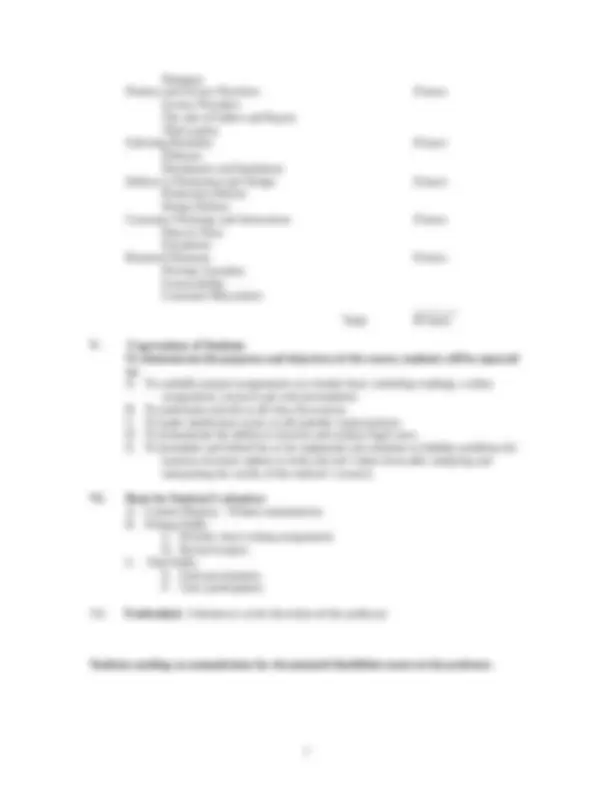



Study with the several resources on Docsity

Earn points by helping other students or get them with a premium plan


Prepare for your exams
Study with the several resources on Docsity

Earn points to download
Earn points by helping other students or get them with a premium plan
Community
Ask the community for help and clear up your study doubts
Discover the best universities in your country according to Docsity users
Free resources
Download our free guides on studying techniques, anxiety management strategies, and thesis advice from Docsity tutors
The syllabus for the ba667 course, liability risks in products and services, offered by the department of accounting, finance & business law at southeast missouri state university. The course, which is new as of spring 2000, covers the impact of tort law on american businesses in the production of goods and services, with a focus on liability issues unique to the service sector and consumer protection issues in a regulatory environment. Students will develop skills in critical thinking, reasoning, and legal research, as well as oral and written communication skills.
Typology: Study notes
1 / 2

This page cannot be seen from the preview
Don't miss anything!


Southeast Missouri State University Department of Accounting, Finance & Business Law Course : BA Title of Course: Liability Risks in Products and Services New Course: Spring 2000 I. Catalog Description and Credit Hours : This course examines liability laws and how those laws impact American businesses in the production of goods and services. Credit Hours: 3 II. Prerequisite: Admission to the MBA graduate program. III. Purpose or Objectives of the Course: A. To understand the fundamentals of Tort law and how it relates to business. B. To understand liability issues unique to the service sector with particular emphasis on malpractice liability. C. To understand consumer protection issues in a regulatory environment and how they impact business operations. D. To develop skills in critical thinking and reasoning, and to learn to analyze legal cases, journal articles, and other written materials as they relate to the business decision-maker. E. To develop proficiency in using information technology and legal research skills. F. To develop student oral and written skills. G. To build on the following objectives: •1 Demonstrate the ability to locate and gather information. •2 Demonstrate capabilities for critical thinking, reasoning, and analyzing. •3 Demonstrate an understanding of human experiences and the ability to relate them to the present. •4 Demonstrate the ability to integrate the breadth and diversity of knowledge and experience. •5 Demonstrate the ability to make informed, intelligent value decisions. IV. Course Content or Outline: Suggested Time in 50-minute periods Introduction 8 hours Fundamentals of Tort Law Intentional Torts Negligence Strict Liability Fundamentals of Products Liability 7 hours Product safety issues Responsibility for Defective Products Warranties Theories of Legal Action 1
Damages Product and Service Providers 6 hours Service Providers The role of Sellers and Buyers Third parties Selecting Remedies 6 hours Defenses Disclaimers and limitations Defects in Production and Design 6 hours Production Defects Design Defects Consumer Warnings and Instructions 6 hours Duty to Warn Exceptions Required Elements 6 hours Proving Causation Foreseeability Consumer Misconduct Total: 45 hours V. Expectations of Students To demonstrate the purposes and objectives of the course, students will be expected to: A. To carefully prepare assignments on a timely basis, including readings, written assignments, research and oral presentations. B. To participate actively in all class discussions. C. To make satisfactory scores on all periodic exams/quizzes. D. To demonstrate the ability to research and analyze legal cases. E. To formulate and defend his or her judgments and solutions to liability problems for business decision-makers in both oral and written form after analyzing and interpreting the results of the student’s research. VI. Basis for Student Evaluation: A. Content Mastery: Written examinations B. Writing Skills: C. Periodic short writing assignments D. Research paper. C. Oral Skills: E. Oral presentations. F. Class participation. VII. Textbook(s): Selection is at the discretion of the professor. Students needing accommodations for documented disabilities must see the professor. 2